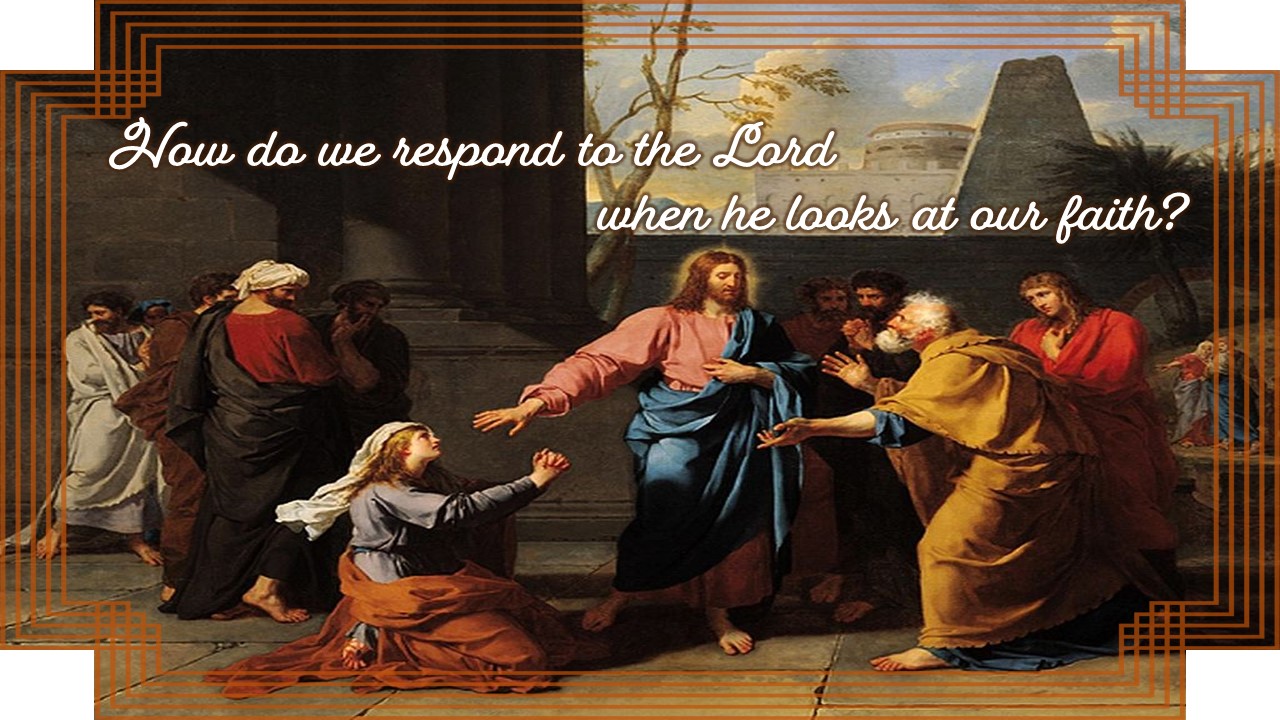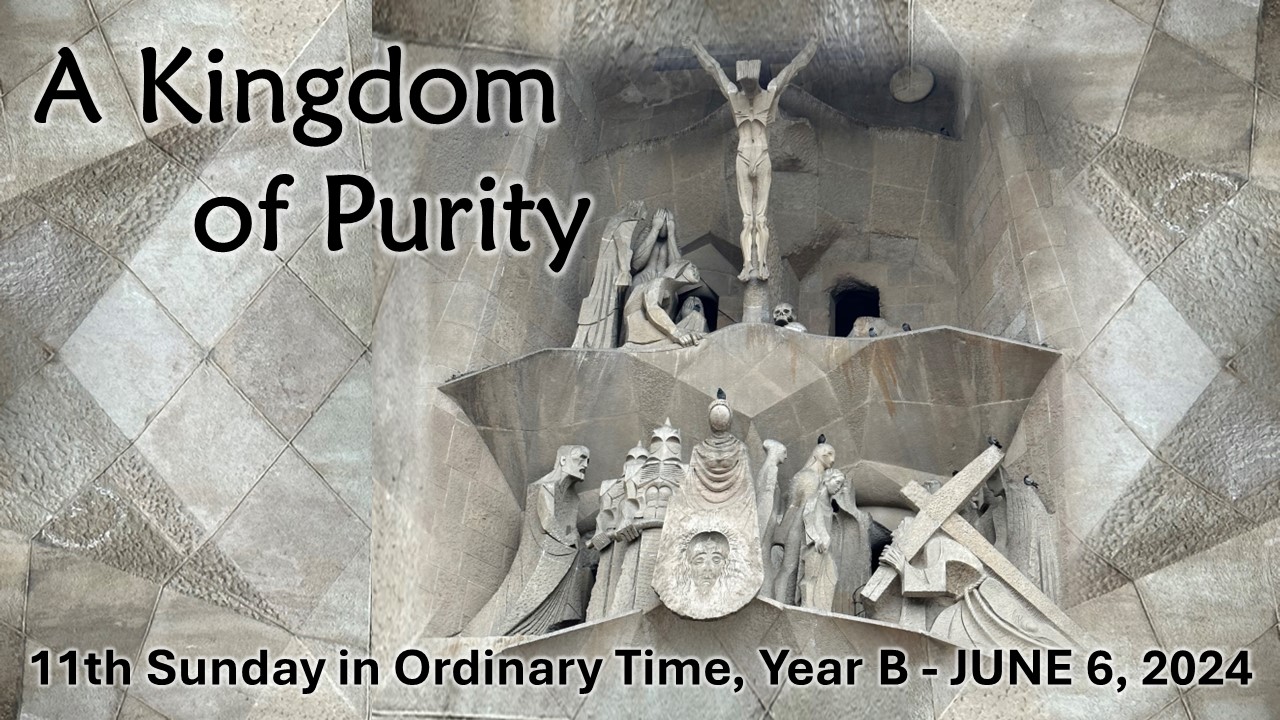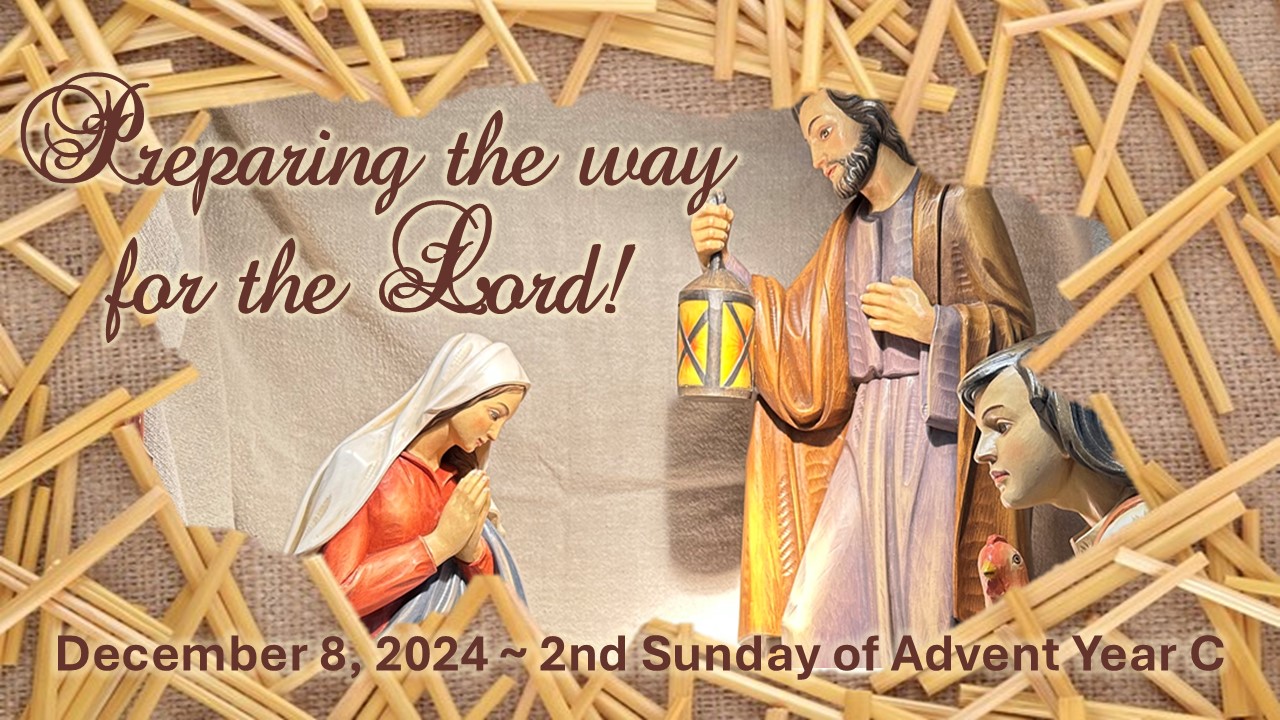
20th Sunday in Ordinary Time- Year A ~ August 20, 2023
HE LOOKS AT OUR FAITH
Each one of us has our own story and it is not always a story “for export”, it is not always a clean story. Many times, it is a difficult story, with a lot of pain, many misfortunes, and many sins. What do I do with my story? Do I hide it? No! We must bring it before the Lord. “Lord, if You will it, you can heal me!” There are always ugly things in a story, always! Let us go to Jesus, knock on Jesus’s heart, and say to Him: “Lord, if You will it, you can heal me!” And we can do this if we always have the face of Jesus before us, if we understand what Christ’s heart is like, what Jesus’s heart is like: a heart that feels compassion, that bears our pains, that bears our sins, our mistakes, our failures. But it is a heart that loves us like that, as we are, without make-up: He loves us like that. “Lord, if You will it, you can heal me!”
St. John Chrysostom helps us to understand the mystery of our story; “Do not think, he says, that you are destined for easy struggles or unimportant tasks. You are the salt of the earth. What do these words imply? Did the disciples restore what had already turned rotten? Not at all. Salt cannot help what is already corrupted. That is not what they did. But what had first been renewed and freed from corruption and then turned over to them, they salted and preserved in the newness the Lord had bestowed. It took the power of Christ to free men from the corruption caused by sin; it was the task of the apostles through strenuous labor to keep that corruption from returning. Have you noticed how, bit by bit, Christ shows them to be superior to the prophets? He says they are to be teachers not simply for Palestine but for the whole world. Do not be surprised, then, he says, that I address you apart from the others and involve you in such a dangerous enterprise. Consider the numerous and extensive cities, peoples, and nations I will be sending you to govern. For this reason, I would have you make others prudent, as well as being prudent yourselves. For unless you can do that, you will not be able to sustain even yourselves.
We live in a social world where we all need help from each other. Our help and support are more important and valuable when we receive it during difficult times and hardships in life. St. Mother Teresa said, “Do small things with great Love”. Our little acts of kindness and help can change the world and the lives of other people. Let me share this story to remind all of us to give a helping hand to anyone who is in need.
A man was driving his car, when he saw an old lady, stranded on the side of the road, he saw that she needed help. So, he stopped his Pontiac near her Mercedes and got out. He smiled, while he was approaching her, still she was worried, as nobody had stopped for hours. Moreover, he did not look safe, as his appearance was so poor and shabby. He could see, how frightened she was, so he tried to calm her: “I’m here to help you, don’t worry. My name is Jim”. The tire was flat, so he had to crawl under the car. While changing the tire, he got dirty, and his hands were hurt. When the job was done, she asked how much she owed him for his help. Bryan smiled. He said: “If you really want to pay me, the next time you see someone who needs help, give that person the needed assistance. And think of me”.
That same evening, the lady stopped by a small cafe. That place looked dingy. Then she saw a waitress, nearly eight months pregnant, wiping her wet hair with a towel. The waitress had a sweet friendly smile, although she had been on her feet the whole day. The lady wondered how someone, who has so little, can be so kind and giving to a stranger. Then she remembered Bryan. The lady had finished her meal and paid with a hundred-dollar bill. The waitress went to get change and when she came back, the lady was gone. She left a note on the napkin: “You do not owe me anything. Somebody once helped me, just like I am helping you now. If you really want to pay me back, do not let this chain of love and help end with you”. The waitress found four more one hundred bills under the napkin.
That night the waitress came home earlier. She was thinking about the lady and the money she left. She was wondering, how the lady could know, how much she and her husband needed it, especially now, when the baby will soon arrive. She knew that her husband worried about that, so she was glad to tell him the good news. After listening to her story, her husband mentioned what he did for an old lady a few days earlier. She kissed him and whispered “Now everything will be all right. I love you, Jim”.
Today in the Scripture Readings we find the same message: Open our hearts to help and support others. The Prophet Isaiah in the First Reading delivered the message of God to the House of Israel. It reminds us to understand the demand of God we need to carry; “Maintain justice, and do what is right, for soon my salvation will come, and my deliverance be revealed”. God fills everyone with his joy and happiness to those who love his name and hold fast to his covenant: “These I will bring to my holy mountain and make them joyful in my house of prayer; their burnt offerings and their sacrifices will be accepted on my altar; for my house shall be called a house of prayer for all peoples”.
Today’s Gospel presents us with a very unique and shocking example of faith in Jesus’ encounter with a Canaanite woman, a foreigner to the Jews. The scene unfolds as he is walking toward the cities of Tyre and Sidon, northwest of Galilee: it is here that the woman begs Jesus to heal her daughter, who — the Gospel says — “is severely possessed by a demon”. The Lord, at first, seems not to hear this cry of pain, such that it causes the intervention of the disciples who intercede for her. Jesus’ seeming indifference does not discourage this mother, who persists in her invocation.
Why does St. Matthew bring this story of this Canaanite woman? I believe through this story; St. Matthew shares his own pain with the congregation because we all know that St Matthew was an outsider. He was a tax collector. He was forbidden to go into the temple. He was forbidden to pray close to the Holy of Holies because of the kind of work he did, people thought he had joined Rome to oppress his own nation. We can read various accounts in the Gospels where people did not like Jesus sitting and eating with tax collectors as they were considered the biggest sinners in society. In a simple word they were “untouchable”, and the tax collectors were hated. And so, the first thing we need to understand is that this woman is also an outcast. She was someone who was not welcome among the Jewish people, like the Samaritan woman at the well.
Now the Canaanites, as we know, were the people who were the predominant people for many centuries in what we now call Palestine and Israel. They were Semites who believed in all kinds of gods. The Canaanite people were, in a sense, hated by the Jews, because the Canaanites also hated the Jews. When Joshua fought the Battle of Jericho, it was against the Canaanites, who were trying to drive him and the Jewish people into the Jordan. So, the first thing we must know is the Canaanite woman was someone who was an outcast as far as the Jewish people were concerned at that time.
The Holy Father, Pope Francis, reflects on the Gospel in the following way:
This woman’s inner strength, which enables her to overcome every obstacle, is found in her maternal love and in the faith that Jesus can grant her request. This makes me think of the strength of women. With their strength they can obtain great things. We could say that it is love that stirs faith, and faith, for its part, becomes love’s reward. Heartrending love for her daughter causes this woman to cry: “Have mercy on me, O Lord, Son of David”. And her untiring faith in Jesus allows her not to become discouraged even in the face of his initial rejection; thus, the woman “knelt before him, saying, ‘Lord, help me”. Was Jesus really ignoring her? Was he not interested in helping her? Why did Jesus hear her when she cried out to him about her daughter being possessed by the demon? Jesus also left everyone to deal with Jairus’ daughter who was dead. There were many more questions we may have to raise.
This is the first time we feel that he is failing someone. He remains silent. And the silence is almost as if he did not want to say anything at all. And his disciples came, and they started urging him, saying, “Send her away, because she keeps shouting at us and following us.” And they wanted to heal her, because that’s what you do when someone troubles you: you kind of treat them nice for a minute so that they’ll get out of there and go someplace else. But Jesus is still quiet. Is he really ignoring her? I believe he is not ignoring her at all but giving her the chance to examine her inner self. He knows her heart and mind and even her life. Jesus’ question to her, clarifies my stand that he did not ignore her at all: “It is not fair to take the children’s food and throw it to the dogs.” What does he mean by this? Jesus wanted her to understand that if she wants a healing then she must turn away from her ways and believe in the real presence of God.
In the end, before such persistence, Jesus was in awe, nearly astonished, by the faith of the pagan woman. Therefore, he acquiesces, saying: “O woman, great is your faith! Be it done for you as you desire.” And her daughter was healed instantly. Jesus points to this humble woman as a model of unwavering faith. Her persistence in beseeching Christ’s intervention is an incentive for us not to become discouraged, not to despair when we are burdened by life’s difficult trials. The Lord does not turn away his face to our needs even if at times he seems insensitive to our requests for help, it is to put us to the test and to strengthen our faith. We must continue to cry out like this woman: “Lord, help me! Lord, help me!”, with perseverance and courage.
The Holy Father continues to say “This Gospel episode helps us to understand that we all need to grow in faith and fortify our trust in Jesus. He can help us to find our way, when we have lost the compass of our journey; when the road no longer seems flat but rough and arduous, when it is hard to be faithful to our commitments. It is important to nourish our faith every day, by carefully listening to the Word of God, with the celebration of the Sacraments, with personal prayer as a “cry” to him — “Lord, help me!” — and with concrete acts of charity toward our neighbour.”
Let me conclude my reflection with the following story: Once upon a time an Angel of God went for a short stroll around the city. He saw a poor man begging. He felt pity for him, and he gave him a bag full of 100 gold coins. The man was very happy and thanked him. He left for his home. On the way, he saw another person who needed help. The man could have spared a coin or two to help that person; however, he chose to ignore it. Then on his way home, a thief robbed him of his bag of coins and ran away.
The man became dejected and went back again to beg. The next day, when the Angel saw the same man begging, he was surprised that after getting a bag full of coins which can last a lifetime, the man was still begging! He called the man and asked him the reason for this. The man told him about the whole incident. The Angel again felt sorry for him. So, this time he gave him a diamond.
The man again was very happy and left for home and again he saw someone who needed help, but he chose to ignore him again. Upon reaching home, he safely put the diamond in an empty pot of water with a plan to cash it in later and live a wealthy life. His wife was not at home. He was very tired, so he decided to take a nap. At this time, his wife came home and picked up that empty pot of water, walked towards the river close by to fill it with water. She had not noticed the diamond in the pot. Upon arriving at the river, she put the whole pot into the running river water to fill it. She filled up the pot, but the diamond was gone with the flowing water!
When the man woke up, he went to look for the pot and asked his wife about the diamond. She told him, she had not noticed it and it must have been lost in the river. The man could not believe his bad luck and again started begging. Again, the Angel felt bad and started thinking whether this man will ever be able to live a happy life. This time he decided to give him only one coin which was not even enough to buy a lunch or dinner for one person.
On the way, the man was thinking that one coin cannot even buy a lunch for one person. Why would the Angel give so little? He saw a fisherman who was getting a fish out of his net. The fish was struggling. The man felt pity for the fish. He thought this single coin won’t be able to solve his problem, so why not to save the fish. So, the man paid the fisherman and bought the fish. He put the fish in his small pot of water which he always carried with him.
The fish was struggling in the small pot of water and ended up throwing a diamond from its mouth! The man screamed with joy, “I got it, I got it”. At that same point, the thief who had robbed the man’s bag of 100 gold coins, was passing through. He thought that the priest recognized him and may punish him. He got nervous and ran to the priest. He apologized to the man and returned his bag full of 100 gold coins. The man could not believe that by helping others, he was being helped.
Let us entrust ourselves to the Holy Spirit, so that he may help us to persevere in faith. The Spirit instills courage in the heart of believers; he gives our life and our Christian witness the power of conviction and persuasion; he helps us to overcome scepticism toward God and indifference toward our brothers and sisters. Let’s never give up our hope and trust in the Lord, like this woman but continue to pray for each other’s strength and encouragement so that our strong faith may win the favour of the Lord, and everything should be done according to his Word.
Other Sermons In This Series

11th Sunday in Ordinary Time, Year B – JUNE 6, 2024
June 14, 2024

2ND SUNDAY OF ADVENT YEAR C ~ DECEMBER 8, 2024
December 05, 2024

11th Sunday in Ordinary Time Year A ~ June 18, 2023
June 16, 2023

